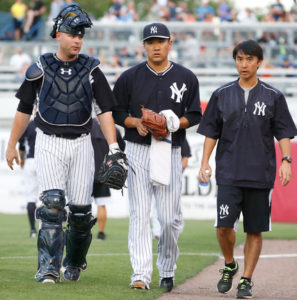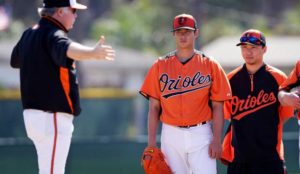 Interpreters in baseball have been a recent trending topic among TV reporters and analysts. Boston Red Sox announcer Jerry Remy took issue with an interpreter being needed for New York Yankees’ pitcher Masahiro Tanaka. He does not think interpreters should be allowed to accompany coaches on mound visits and that the players need to “learn baseball language.”
Interpreters in baseball have been a recent trending topic among TV reporters and analysts. Boston Red Sox announcer Jerry Remy took issue with an interpreter being needed for New York Yankees’ pitcher Masahiro Tanaka. He does not think interpreters should be allowed to accompany coaches on mound visits and that the players need to “learn baseball language.”
Mike Schmidt, the Philadelphia Phillies former third baseman, stated in a radio interview that Odubel Herrera would have a hard time becoming a team leader based on his need for an interpreter. Schmidt was later said to have called Herrera to apologize for his comments.
The need for interpreters in Major League Baseball is nothing new. There have been plenty of foreign speaking players in the league for decades, and some have had interpreters while others have not. The difference in these two situations is that one involves general translating from day to day, and the other is the need for a translator in the middle of a game in the middle of an inning during a mound visit.
While Remy may have a point that foreign speaking pitchers need to learn baseball language, there is a much bigger gap in language barriers concerning situations and how to handle the game. It is not as easy as telling someone to throw strikes or to get a ground ball. Each coach has his own philosophies for what is said during mound visits, and there is definitely the need for a translator to communicate properly the message he intends to convey to the pitcher.
There doesn’t seem to be much added time to mound visits involving interpreters – the interpreter won’t know exactly what is going to be said, but it is not like he is interpreting a long speech. The coach knows what he wants to say, and more than likely the pitcher has an idea of what is going to be said as well. Players aren’t at the Major League level without having a sense of the game, especially a player of Tanaka’s ability.
 Herrera’s situation is a bit different. He is a quality starter at 25 who could turn into a solid franchise player. His ability to become a team leader isn’t necessarily based on his English speaking ability. It might be a factor when discussing certain situations with teammates, but you don’t have to speak English to play well. There are different types of leaders on the field and in the clubhouse, and not every leader is a vocal one. Playing hard everyday and showing your teammates that you have a passion for the game and dedication to winning is a nonverbal way to be a leader. Herrera may or may not embody that type of personality, but it is apparent Mike Schmidt doesn’t think he will be giving any motivational speeches in the locker room before games.
Herrera’s situation is a bit different. He is a quality starter at 25 who could turn into a solid franchise player. His ability to become a team leader isn’t necessarily based on his English speaking ability. It might be a factor when discussing certain situations with teammates, but you don’t have to speak English to play well. There are different types of leaders on the field and in the clubhouse, and not every leader is a vocal one. Playing hard everyday and showing your teammates that you have a passion for the game and dedication to winning is a nonverbal way to be a leader. Herrera may or may not embody that type of personality, but it is apparent Mike Schmidt doesn’t think he will be giving any motivational speeches in the locker room before games.
One of the best players to play the game has used an interpreter ever since he arrived on the MLB scene back in 2001. Ichiro Suzuki has used an interpreter even though it is said that the future Hall of Famer has a good grasp on the English language. He does so in hopes of answering questions correctly and not having a misrepresentation of what he says. That is a responsible way of handling his situation and making sure that reporters don’t try to coerce him into saying something he doesn’t understand. At this point, Ichiro can say whatever he wants, but he still feels the responsibility to be correct in his interviews.
The need for interpreters will only grow as Major League Baseball strives to be a more international game. The first language barrier was Spanish. Next came Japanese with players like Hideo Nomo and Hideki Irabu. There are currently MLB players from 23 different countries, and while many speak English, Spanish, or Japanese, there are those who speak none of those fluently. Imagine a German or French born player making his way to the Show; you would hard pressed to find players or coaches who speak those languages who could act as a translator.
 This is only discussing the Major League level. At the minor league level, foreign speaking players must find a way to communicate with coaches to develop their skills and adapt to the culture if need be. Again, there are enough Spanish speaking players and coaches at this point to properly assist those players, but the other predominant languages have to have an interpreter somewhere to communicate what can’t be done through “baseball language.”
This is only discussing the Major League level. At the minor league level, foreign speaking players must find a way to communicate with coaches to develop their skills and adapt to the culture if need be. Again, there are enough Spanish speaking players and coaches at this point to properly assist those players, but the other predominant languages have to have an interpreter somewhere to communicate what can’t be done through “baseball language.”
Major League Baseball requires its teams to have two full-time Spanish language interpreters. This was implemented in 2016. There are ample players and coaches within each organization who can also help translate Spanish to English and vice versa. Asian players tend to have personal interpreters. There is not enough of a presence yet to warrant MLB requiring teams to have full-time interpreters for these players. That would require multiple languages from possibly multiple translators for players who might not even be on the roster. Personal interpreters suit Asian players best at this point.
Interpreters in Japan
This topic is not confined to Major League Baseball. Nippon Professional Baseball in Japan also has a mix of players with language barriers. English, Japanese, Spanish, Chinese, and Korean are the main languages spoken by players, and teams need to have interpreters between any of those for players on their rosters. Although MLB is the goal of most professional baseball players, the need for an interpreter no matter the location is just as important.
There may be a “baseball language” amongst the sport, but there is definitely not a universal language between players, unless you consider expressed emotions. As long as an interpreter doesn’t hinder the pace of a game during coaching visits to the mound, there is no reason why they should not be allowed on the field. If a player feels he is not being understood correctly off the field, whether in interviews or conversation with coaches and players, then he should be entitled to an interpreter supplied by the league or himself. Although MLB encourages its players to learn English, that is not the reason they are being paid; they are being paid to play the game. The players need tools to help them succeed, including interpreters in baseball.

Willing to teach baseball language in Spanish.
I’m a bilingual player, teacher.